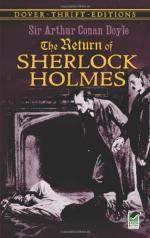“The other bicycle.”
“Let us continue our reconstruction. He meets his death five miles from the school—not by a bullet, mark you, which even a lad might conceivably discharge, but by a savage blow dealt by a vigorous arm. The lad, then, had a companion in his flight. And the flight was a swift one, since it took five miles before an expert cyclist could overtake them. Yet we survey the ground round the scene of the tragedy. What do we find? A few cattle-tracks, nothing more. I took a wide sweep round, and there is no path within fifty yards. Another cyclist could have had nothing to do with the actual murder, nor were there any human foot-marks.”
“Holmes,” I cried, “this is impossible.”
“Admirable!” he said. “A most illuminating remark. It is impossible as I state it, and therefore I must in some respect have stated it wrong. Yet you saw for yourself. Can you suggest any fallacy?”
“He could not have fractured his skull in a fall?”
“In a morass, Watson?”
“I am at my wit’s end.”
“Tut, tut, we have solved some worse problems. At least we have plenty of material, if we can only use it. Come, then, and, having exhausted the Palmer, let us see what the Dunlop with the patched cover has to offer us.”
We picked up the track and followed it onward for some distance, but soon the moor rose into a long, heather-tufted curve, and we left the watercourse behind us. No further help from tracks could be hoped for. At the spot where we saw the last of the Dunlop tire it might equally have led to Holdernesse Hall, the stately towers of which rose some miles to our left, or to a low, gray village which lay in front of us and marked the position of the Chesterfield high road.
As we approached the forbidding and squalid inn, with the sign of a game-cock above the door, Holmes gave a sudden groan, and clutched me by the shoulder to save himself from falling. He had had one of those violent strains of the ankle which leave a man helpless. With difficulty he limped up to the door, where a squat, dark, elderly man was smoking a black clay pipe.
“How are you, Mr. Reuben Hayes?” said Holmes.
“Who are you, and how do you get my name so pat?” the countryman answered, with a suspicious flash of a pair of cunning eyes.
“Well, it’s printed on the board above your head. It’s easy to see a man who is master of his own house. I suppose you haven’t such a thing as a carriage in your stables?”
“No, I have not.”
“I can hardly put my foot to the ground.”
“Don’t put it to the ground.”
“But I can’t walk.”
“Well, then hop.”
Mr. Reuben Hayes’s manner was far from gracious, but Holmes took it with admirable good-humour.
“Look here, my man,” said he. “This is really rather an awkward fix for me. I don’t mind how I get on.”




